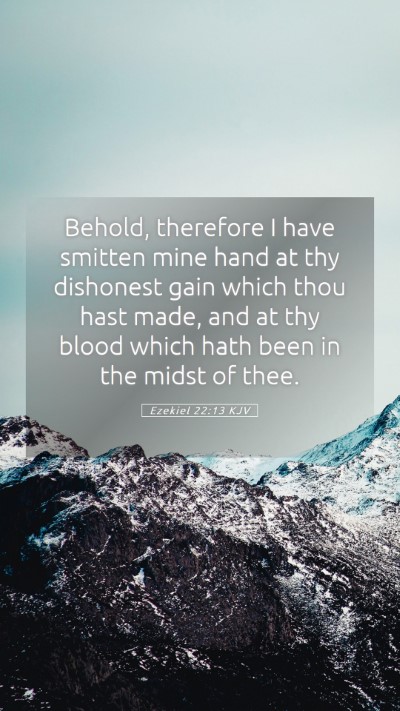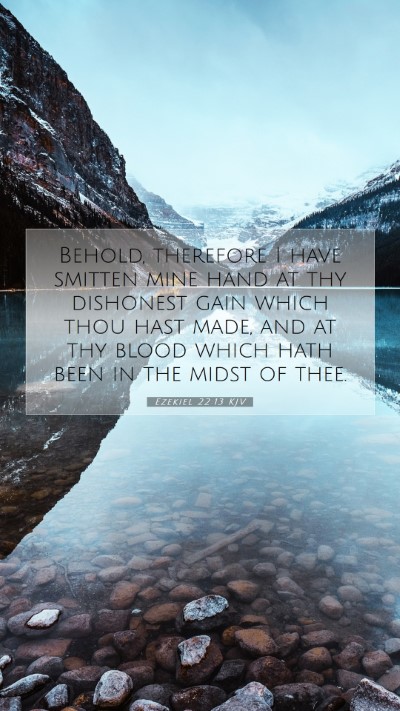Bible Verse Meaning and Commentary for Ezekiel 22:13
In Ezekiel 22:13, the Lord speaks through the prophet Ezekiel, expressing His condemnation of the people for their iniquities and injustices. This verse illustrates the gravity of the situation in Jerusalem during a time of moral decay and spiritual decline.
Meaning of Bible Verses: It reveals the heart of God as He observes the actions of His chosen people. The verse reads,
"Behold, I have smitten mine hand at thy dishonest gain which thou hast made, and at thy blood which hath been in the midst of thee." This indicates that the Lord is not only aware of their sins but is also deeply affected by the injustices they commit against one another.
Bible Verse Interpretations
-
Matthew Henry's Commentary: Matthew Henry highlights the concept of divine judgment in his commentary. He explains that the striking of God’s hand signifies His anger and displeasure at the acts of corruption permeating Jerusalem. He emphasizes that the dishonest gain refers to wealth acquired through deceit and exploitation.
-
Albert Barnes' Notes: Barnes focuses on the phrase "I have smitten mine hand," interpreting it as an expression of God's intense displeasure. He underscores that the “blood in the midst of thee” represents the bloodshed caused by the unjust actions of the people, suggesting a society steeped in violence and immorality.
-
Adam Clarke's Commentary: Clarke offers insight into the social and moral erosion present in Jerusalem. He notes that the Lord's response indicates a breaking point where the accumulated sins cannot be overlooked. The reference to blood further implies that the people's violent actions are not just limited to spiritual failings but also manifest in real-world consequences.
Understanding Scripture in Context
To fully grasp the essence of Ezekiel 22:13, one must consider the historical context. The book of Ezekiel comes during a period of impending judgment and exile for the Israelites. The prophet’s role involves admonishment and calls for repentance, reflecting the overarching narrative of accountability and the need for change.
In-Depth Bible Verse Analysis
The phrase "dishonest gain" in this verse calls attention to issues of ethical conduct in economic matters during Biblical times. The people of Israel had strayed from God’s commandments, leading to injustice where the vulnerable were exploited. This analysis should resonate in today’s society, prompting readers to reflect on their own ethical practices.
Applying Bible Verses to Daily Life
For contemporary readers, Ezekiel 22:13 serves as a powerful reminder of the consequences of injustice and the need for integrity. It challenges individuals to examine their own actions and attitudes towards others, emphasizing that God takes notice of our moral choices.
Additional Cross References
- Isaiah 1:15-17: This passage also addresses Israel's sinful practices and the need for repentance.
- Jeremiah 7:6-7: Here, the prophet Jeremiah speaks against similar issues of injustice and corruption in society.
- Micah 6:8: This verse encourages justice, mercy, and humility as central tenets of a faithful life.
Bible Study Insights
Engaging with Ezekiel 22:13 in bible study groups can foster deep discussions on morality and ethics from a Biblical perspective. Utilizing bible study tools such as commentaries or concordances can enhance understanding and lead to a richer exploration of Scripture.
Conclusion
Ezekiel 22:13 is an evocative scripture that underlines the seriousness of moral failings and the Lord’s righteous anger towards injustice. It invites us to consider our own lives and encourages a commitment to integrity and righteousness. Through this verse, one gains not only understanding but also a call to action in their spiritual journey.


